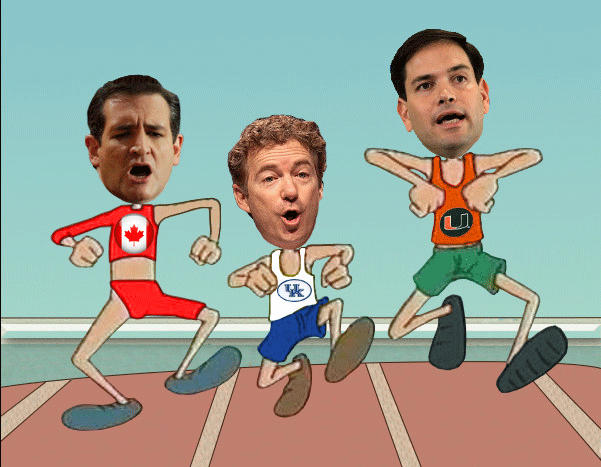Rand Paul vs. Marco Rubio: Tea Party Fracas Over Foreign Policy and Immigration "Amnesty"
In the debate tonight, Paul needs to sell his foreign policy, but he's got nothing fresh on immigration
Heading into tonight's Republican presidential debate airing on Fox Business News, Florida's Marco Rubio is handily ahead of rest of the Senate Tea Party candidate pack in the polls (hovering between 11 and 14 percent recently, behind the peculiar frontrunner pair of Donald Trump and Ben Carson, and ahead of fellow Floridian Jeb Bush, who has noticed).

This week the farthest-behind Tea Party Senator, Rand Paul of Kentucky, has apparently eyed Rubio as a rival who needs to be taken down. Paul has bashed the Floridian over foreign policy and immigration. (Rubio is being hit from all sides for largely abandoning his job as Senator as he runs, but I'm not sure that's a very resonant point with a GOP primary electorate.)
For those rooting for the most libertarian Rand Paul they can get, the foreign policy part is a good sign, the immigration not so good. While I give Paul credit for speaking his actual policy mind on both issues, not going purely for political gain, I doubt either tactic is going to prove political gold.
Maintaining Paul's foreign policy realism cred likely misreads the typical Republican voter's feelings on foreign policy. And people in a tizzy about people living or working here without their papers in order don't need Rand Paul.
On foreign policy, as Paul said on CNN on Sunday:
"I see [Hillary Clinton] and Rubio as being the same person," he said. "They both wanted a no-fly zone. They both have supported activity in Libya -- the war in Libya that toppled Gadhafi, an intervention that made us less safe.
"They both have supported pouring arms into the Syrian civil war, a mistake that I think allowed ISIS to grow stronger. And they both have supported the Iraq War. So I mean, what's the difference?"
He was particularly critical of both Clinton and Rubio over Libya, saying the two had advocated an intervention that led to instability and turned the country into fertile territory for ISIS.
"I fault Hillary Clinton. I fault President Obama. But I also fault the neoconservatives within my party like Rubio who have been eager for war in Libya, in Syria, in Iraq, and they want a no-fly zone in an airspace where Russia is already flying," Paul said.
"It's a foolhardy notion, and people really -- this is the kind of stepping it up to a debate over who would best be commander in chief that we really need in our country," he added.
As Matt Welch has documented here, Rubio is indeed a worst of every world foreign policy nut who has learned nothing from the mistakes and bad outcomes of past interventions and thinks everything will be better with more, while also pretending this is compatible with fiscal conservatism. Remember when Rand Paul made the damaging-to-his-reputation call for a military budget rise of 16 percent over the next two years, with accompanying cuts elsewhere? That was supposedly intended as a procedural jab at Rubio for making the same proposal with no sense of how to pay for it.
Will reminding Republicans Hillary shares those awful qualities be helpful with Paul's immediate political task of knocking Rubio down a peg or three?
Sure, Republicans hate Hillary reflexively, which is doubtless why Paul thinks it might be a gotcha to point out that she shares Rubio's foreign policy views. But Rubio's closeness to Clinton on those issues is shared by the rest of the GOP field, even supposed fresh-air outsiders Trump and Carson. (Trump at best is wary of foreign interventions that don't directly fill imperial coffers.)
Paul, unfortunately, remains resolutely outside the mainstream of what either major party wants to offer in his relative foreign policy realism and sense. He's so far seemed to fail at selling the value of his point of view to his potential national constituents. Doing so should be one of his prime goals for tonight.
But the more likely end game of stressing that is that, in the event of a Clinton vs. Paul race next November, lots of formerly somewhat loyal GOP foreign policy minds will just abandon the Republican Party to go where the interventionist action is. Many Republican voters who see American military swagger as essential even if embodied by a woman they hate would likely follow.
On immigration, Paul wants to call Rubio to task for being a prime mover in 2013's failed comprehensive immigration reform bill, which passed the Senate (with both Paul and Cruz voting against) but didn't get passed the House. Paul kept hitting in a Breitbart interview:
"Rubio teamed up with the Hillary Clinton wing [of the Democratic Party] on immigration, teamed up with Chuck Schumer on immigration," Paul told Breitbart News in an exclusive interview here on Friday night over pizza and beer at Millstone Pizza and Taphouse.
"I think it's been a little bit forgotten in some of the debate, but yeah—he was a part of the 'Gang of Eight.' At some point in time, he probably needs to be made to own it. He does own it. It is his baby, but he seems to have disowned his baby right now."
Rubio has not been asked in any of the presidential debates about the only legislative accomplishment he's had as a U.S. Senator — passing the 'Gang of Eight' amnesty bill through the U.S. Senate.
Paul thinks Rubio should be asked about that accomplishment during the upcoming debate in Milwaukee, Wisconsin.
Rubio himself has backed away from that plan, saying that alas any attempt to normalize the already-here illegal must take a backseat to border security. That was pretty much Paul's position during that 2013 debate: encircle the nation in impregnable wall first, think about common sense ways to normalize the currently illegal later.

As Shikha Dalmia has outlined here comprehensively, Paul's actual policy proposals on immigration have been crummily restrictionist, refusing to see the obvious analogies someone of even libertarian sympathies should be able to see with the drug war (which Paul mostly opposes though not to the extent of calling for full federal legalization) and the war on immigration: "they both involve criminalization of minor offenses, militarization of the border, violation of elementary civil liberties, hyper-intrusive surveillance, and over-zealous local enforcement. "
At the same time, Paul's rhetorical framing on immigration has sometimes not been that bad, including nods to the absurdity of actual capture and/or deportation of all current illegals. In essence this means he understands that something that immigration opponents will call "amnesty" is pretty much inevitable.
Rubio at least has the sense to admit that crackdowns on illegal immigrants require the incredibly privacy-violating and life-ruining (when the system doesn't work as planned, which it won't) expedient of an e-verify system through whose bureaucratic maw all of us will have to pass to legally get a job in this country.
Paul likes to pretend that we can keep illegal immigrants from working effectively without interfering with legal Americans rights via federal e-verify mandate. It's nice he recognized a bridge too far for someone with even mild libertarian or civil liberty bonafides with e-verify, but it is the logical conclusion of treating illegal workers as a vital public policy crisis demanding government action.
The weeds of Rubio's current complicated set of immigration proposals can be dug through here.
Rand's father Ron hit the silliness of border-wall security obsession onstage at a GOP debate in 2012, in colorful Ron Paul fashion. "Every time you think of a fence keeping all those bad people out, think about those fences maybe being used against us, keeping us in."
Given Rand Paul's poking at Rubio over the 2013 reform bill, and Rand's pretty consistent calls for increased and effective "border security" as the preface to any immigration reform, it seems impossible we'll see any repeat of that tonight.
Politically, though, Paul can't really distinguish himself from the rest of the restrictionist pack, and if it ever comes down to Paul and an opponent on toughness on immigration, Paul has said plenty of things softer than the average GOP voter probably wants to hear. As Dalmia reported:
Paul delivered a speech before the Hispanic Chamber of Commerce so sympatico to the plight of immigrants that the Statute of Liberty would have wept. He chastised Republicans for treating immigrants as "liabilities rather than assets," supported a pathway to legalization for undocumented workers ("If you wish to live and work in America, then we will find a place for you"), and defended bilingualism ("Republicans who criticize the use of two languages make a great mistake").
While one could be excused for detecting some ambiguity at least in Paul's attitude toward immigration, if not the specifics of his generally restrictive or punitive suggested legislation, Paul insists lately that he's been staying the course, remaining himself, on all issues, saying the same things he's been saying for four years:
"I give the same speech I gave four years ago, with a little bit of variety. But I'm not a believer that really we're doing anything wrong or made a misstep.
"All the stories that say: 'Oh, his campaign sucks, that's why he's doing poorly' … not really. It has nothing to do with my campaign. It has nothing to do with me, really. It may mean people are liking the more bombastic message, but that's just not me.
"I'm giving the same message as when I was higher in the polls."
It may be, then, that Rand Paul 2016 still has a lot of the basic education of the voting public in libertarian, or at least libertarian-ish, ideas to do. (Or maybe he believes if the distractions of Trump and Carson were to disappear, he'd regain ground in comparison to the experienced candidates.)
Tonight's debate would be a good time to really make people understand why Rand Paul's role in the race, and in his Party, is both distinctive and vital. Just mocking Rubio for being part of a failed legislative solution that acknowledged complications involved in the existence of millions of people already here illegally that demand more than just shouts of "no amnesty" isn't apt to help much.
Rubio's press office did not respond to a request for comment on Paul's jabs by time of posting. If they reply later, will update this post accordingly.


Show Comments (9)